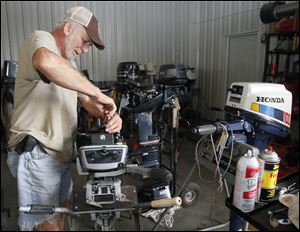
Engine issues nag boaters
Local marinas clean out ethanol residue
7/12/2011
Dennis Schlegel works on a boat motor at Bi-State Marine Service in Erie, Mich. Local marinas say older boats are not as equipped as newer models to deal with the ethanol which is added to gasoline.
Clyde Ehmann, owner of Bi-State Marine Service LLC in Erie, Mich., is performing more carburetor repairs these days.
An increasing number of customers have come to his marina, seeking advice for boats and personal watercraft that aren't running properly.
The problem, Mr. Ehmann said, is that many older watercraft models are unequipped to deal with ethanol in gasoline, resulting in costly repairs.
"We have to tear them apart and clean the carburetors on them quite often," he said.
Such a repair could start at around $500 for some boat models. "We have to replace the fuel lines," Mr. Ehmann said.
Some local marinas and service centers are advising customers about how to care for their watercraft while using gasoline blended with ethanol, a corn-based fuel. Traditional gasoline typically has 10 percent ethanol, and the U.S. Environmental Protection Agency has permitted regular gas to have up to 15 percent.
Although ethanol is considered an eco-friendly alternative fuel, local marine experts say the ethanol-blended gasoline can cause problems for boats and personal watercraft.
In general, they say it is more corrosive than traditional gasoline, and ethanol-blended gasoline could clog engines as it breaks down, among other issues.
"We're picking up debris in the fuel systems because it's breaking down the insides of the fuel hoses," Mr. Ehmann said.
Chris Rising, sales manager at Devil's Lake Water Sports Inc. in Manitou Beach, Mich., said he began seeing more ethanol-related problems in pontoon boats about four or five years ago.
Most of it seems to stem from boats stored in the winter with tanks full of ethanol-blended fuel, which becomes gummed up during the idle months.
"They still run, they just run rather poorly because they're not getting enough fuel flow through the carburetors," said Mr. Rising, explaining how the clogging affects watercraft.
Although ethanol problems have brought in some additional business for Devil's Lake Water Sports, Mr. Rising hesitated to call it a positive addition to the company's bottom line.
"It's just bringing us more work, but it's not good work because people are complaining that they're doing it year after year," said Mr. Rising, who noted that repairs could range from $400 to $1,200. Mr. Ehmann agreed, saying that the marina is typically busy with various types of repairs.
Randy Ortyl, service manager at Honda East Toledo in Maumee, said his store typically doesn't see ethanol-related damage. That's because newer boat and personal watercraft models are built to withstand newer fuels, he said.
"I think most of the manufacturers got them designed now that they run on the lower-grade fuel with the ethanol," said Mr. Ortyl, whose store sells and repairs personal watercraft made by Honda, Kawasaki, Yamaha, and Sea-Doo. Mr. Ehmann said he typically recommends customers buy fuel additives that can help prevent negative effects of ethanol-blended fuel, while Mr. Rising recommends that boaters use marine fuel for their watercraft.
Contact Sheena Harrison at: sharrison@theblade.com or 419-724-6103.